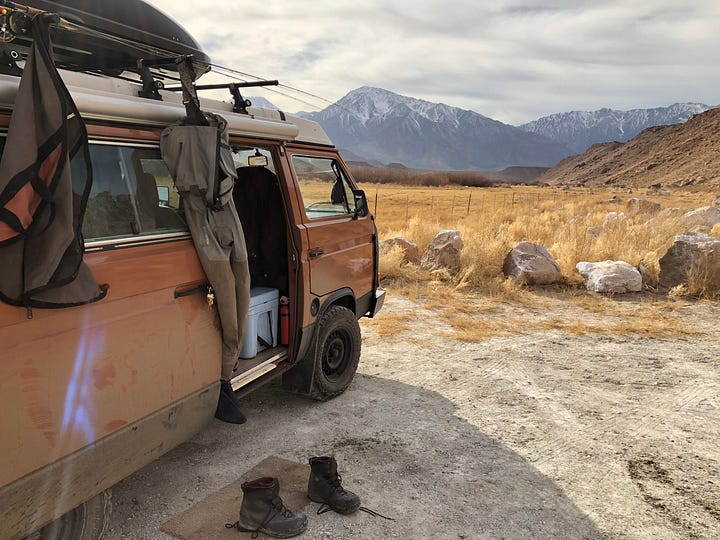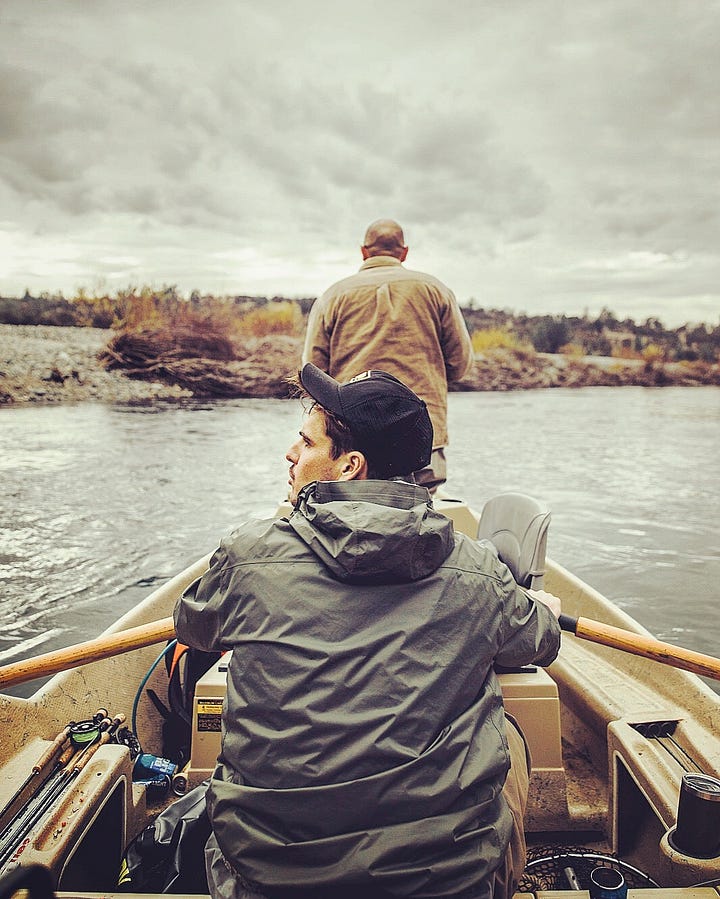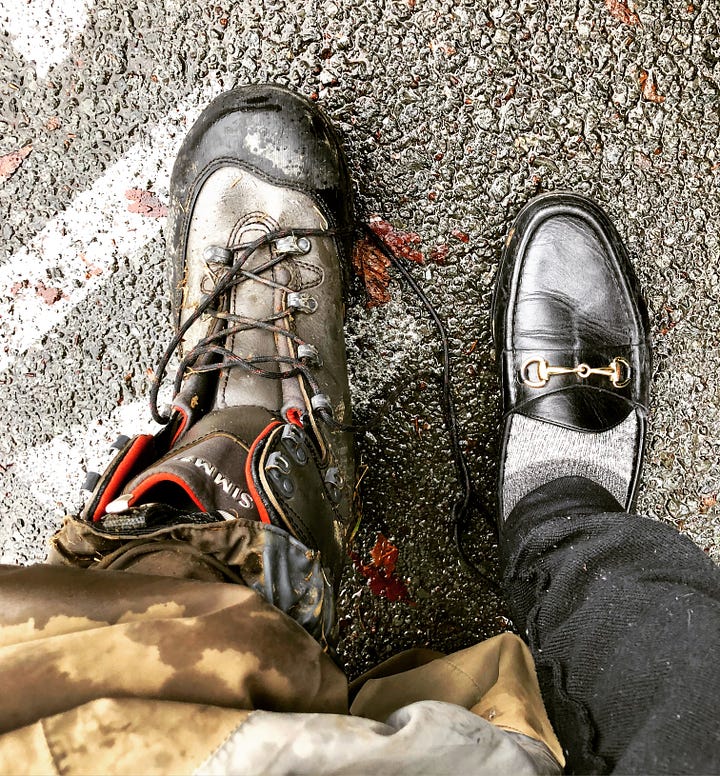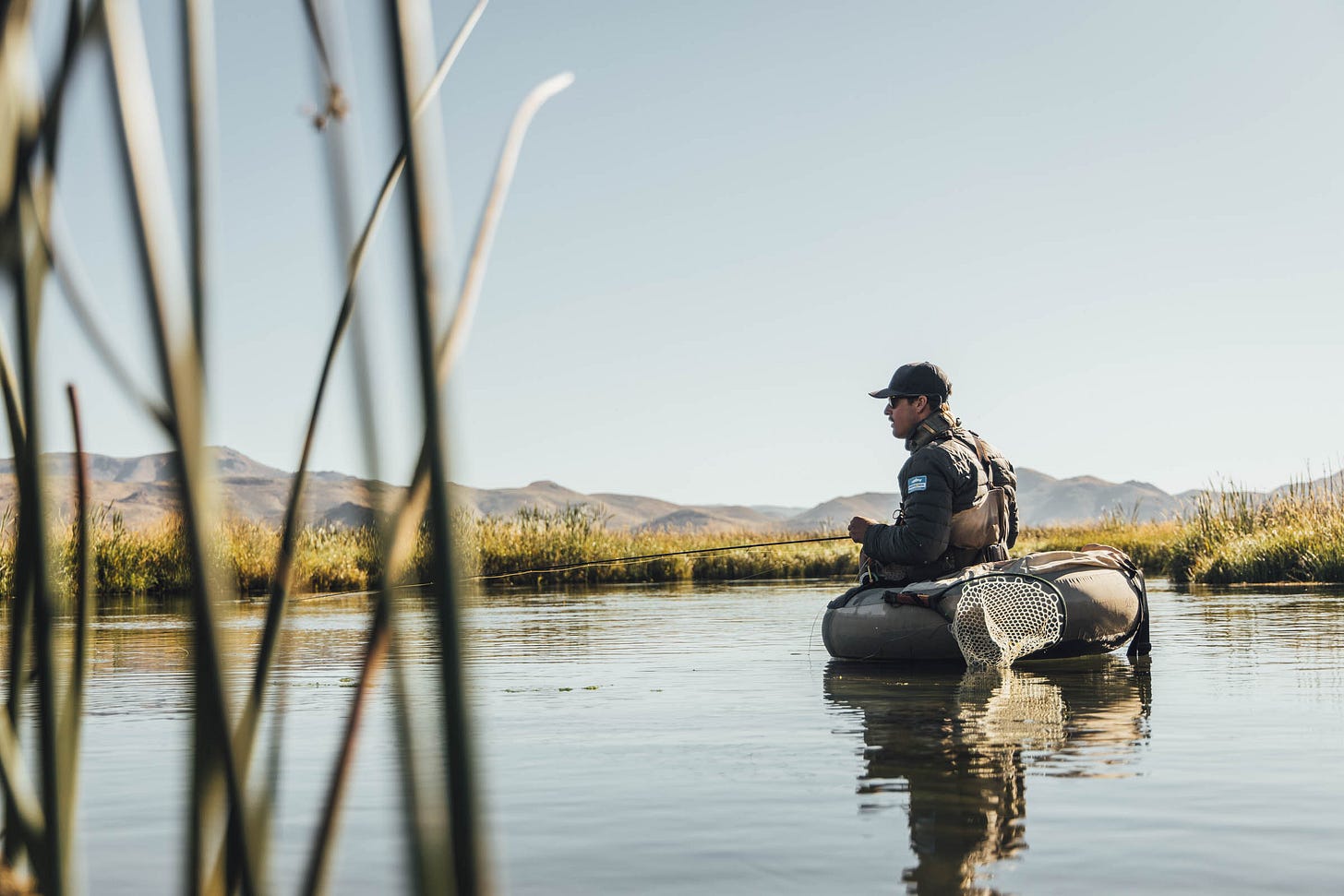The Audacity to Follow Your Curiosity: Interview with Natural Resources Investor and Fisherman, Brent Lawson
This week’s interview is with Brent Lawson, a guy who is just as at home on a drift boat, as he is at his day job working for a private equity firm investing in land and water resources in the American West. He’s figured out a way to honor two different parts of himself: One that loves being immersed in nature and another that thrives on the intellectual challenge of working in financial markets.
After graduating from college, Brent went to work on Wall Street. Two months in he quit and went to work at a fishing lodge in Patagonia, Argentina. He eventually returned to the finance world, until a year and a half later, where he again found himself called to explore a different kind of life. He began guiding fishing trips in Idaho which he still describes as “the best job I’ve ever had.” While in Idaho, he started to network and began his path into natural resource investing where he finds himself today.
I know what you’re thinking: How did he do it? How did he actually gather the courage to leave a prestigious job and go do something radically different? How did he handle the twists and turns and confront things like self-doubt and the fear of what others might think? What ultimately led him to power through the uncertainty and create a life that is uniquely his?
Our conversation covered:
Brent’s story in his words
The moments that prompted his decision to leave Wall Street
The mindset shift that gave him the courage to take a different path
How he’s learned to grapple with the fear of what others think
What allowed him to “keep the faith” over the years as he navigated the twists and turns that led him to his current path
The picture of the life that is uniquely his
Note: The following interview has been lightly edited for clarity and length. While every effort has been made to preserve the integrity of the conversation, please be aware that the quotes may not be verbatim but reflect the essence of the dialogue.
Setting the scene:
Where are you living right now? I'm in Boise, Idaho. I spend roughly half my time here, and half my time on the road A lot of small towns between Colorado, Arizona, and the Pacific Northwest (Idaho, Oregon, and Washington).
How would you describe your occupation? My cocktail hour response is that I help people buy land and water. The more detailed answer is that I am a partner at a private equity fund developing solutions to water challenges in the American West. We are investing in land, water, and infrastructure assets that deliver the raw water resources and the mechanisms to deliver said water across the western US.
What's something you're working towards right now, either personally or professionally? On the personal side, I have a more ethereal answer. I'm really working on learning to be still. It's not necessarily a meditative process, but just the discipline of being still and being quiet and letting my mind work naturally. Professionally, I'm really intrigued by municipal water infrastructure systems and the unfunded infrastructure gap in the United States, as well as the problems associated with that, both from a water quality and water quantity perspective. I'm really curious professionally to learn about the precedent transactions of how municipalities fund projects for existing infrastructure and new growth infrastructure. Some cities have grown exponentially with the “zoom boom” and don’t have the literal pipe and wastewater treatment facilities to facilitate that growth. Yes, it's very random and very, very niche!

You have such an interesting path to where you are today. What’s the story in your words?
My preamble to all of this is that hindsight is 20-20. I sit here today and have the language to be able to articulate a beautiful story. But the story was marked by multiple periods of complete unknown, complete doubt, complete insecurity, fear of what other people think, and just the fear of “what the hell am I doing right now?”
If I were to try to distill my whole journey and path down - my story was really about reconciling these two strong parts of who I am. My journey was trying to figure out how to reconcile them from a professional standpoint, an intellectual standpoint, and just a lifestyle or structural standpoint. I studied economics at Yale. I always had an affinity towards quantitative thinking and reasoning. I loved financial markets. I love capital flows. I love macroeconomics. I love reading about that in my free time. That’s the first side.
Simultaneously, I love natural resources. I grew up fishing and hunting. My grandfather was a dairyman. I spent a bunch of time as a kid running around family friends’ ranches. I felt so alive on the ranches. My spirit loved being outside and being around natural resources. That manifested in my love of fishing.
What happened practically was that I went to Yale and started the fishing club, studied economics, and went down the well-worn path of consulting or banking. I’d go to all the networking happy hours, eat my free crackers, and learn about the Goldmans, JP Morgans, etc. Blah, blah blah. Everyone was going to work for a big bank, and I jumped on the train. It wasn't a terrible decision, it was just succumbing to the pressure of what everyone else was doing.
So I did that, graduated from Yale, and returned to the bank where I’d interned the summer before, intending to work there full-time for the long term. That lasted about 2 months. I just said, “This ain't working.” I was working at Guggenheim Partners doing structured debt trading, which I actually enjoyed intellectually, but felt misaligned with the culture and structure. I was living in New York, working all hours, and I just realized, “This isn't working. I wanna go explore this other side of me.” That led me to the tip of Southern Patagonia, where I worked at a fly fishing and hunting ranch called Patagonia River Guides. I guided fishing trips, picked grapes on the vineyard, hosted guests, and did some of their financials. It was just amazing, but it was probably a little bit too far on that other side of the spectrum. It was isolated and full of beauty, but I wasn’t being as challenged intellectually.
Eventually, I returned to California where I’m from. I said, “Hey, pick yourself up by the boots and go back into this finance path.” Ironically enough, I hadn’t learned my lesson just yet and started applying to shops in New York. I ended up working at PIMCO in Newport Beach trading bonds. Again, it was intellectually interesting but culturally just didn't work. I left and went to Idaho where I guided fishing trips. That’s where the story really begins to pivot. I was full-on fishing every day and absolutely loving it. I was getting paid to do the best job I’ve ever had. I would love to do it again. I will do it again down the road.


I finally hit that point where I said, “Wow, what a novel idea! Maybe there's a balance here.” It took me 3 years of a lot of headaches. My poor mom was probably worried sick. I reached out to a guy who was doing natural resource investing in the farmland space in Boise and all these guys that I knew of in the space. I looked at all sorts of stuff and ended up finding Skye Root who happened to be in Boise, where I was living. The group is called Root Agricultural Advisory. I worked there for 5 years. We were an acquisition arm for a private equity fund investing in US farmland.
About a year ago, I ended up in my current role with a partner who also went to Yale. We were both working on similar strategies buying farmland and water.
What a story! I have so many questions. Let’s start with your decision to leave that first finance job in New York. How did you know you had to leave? Did you know right away that you would go to Patagonia or did that come together after the fact?
I think there were two key moments. I just distinctly remember the first. It was maybe my third or fourth weekend working. It was a Thursday night at 10:45. I got home, was sitting in my room, and just thought, “What in the world am I doing with my life?” The second key moment was a Saturday at 11:00 am. I was taking the subway to go work on a Saturday. No one else was there. I had plans with 3 of my buddies to go take the Long Island train out to Montauk to go striper fishing. I love to fish out there. I had to cancel those plans. When I got there and was sitting in the empty office, I just thought, “What is this?”
I didn’t know about Patagonia and all the adventure from day 1, but there was some rhyme and reason to it. Ever since I was in middle school or high school, I've had this captivating dream of trying to start a destination fly fishing lodge myself, so much so that I wrote my Yale senior economics thesis on the value of recreational fishing in Belize. I somehow got the school to pay for me to do a “research” trip there where I just fished for 3 weeks. After I left New York, I actually came out West and fished for a month in my truck. I fished all over Montana and Idaho, started networking, and asked people, “Hey, where can I go to learn how to operate a fly fishing lodge at one of the best lodges in the world?” I looked at two places. One was in the Seychelles, in the Indian Ocean. The second was this ranch in Patagonia, Argentina. That was really the decision node that brought me there. Even though it wasn’t necessarily a clear path, there was some rhyme to the madness.


I am really interested in your mindset because I can imagine a lot of people reading this conversation currently work in finance or a similar industry. They're probably thinking, “That sounds awesome. I would love to do that…but I can't.” What was the mindset shift that really allowed you to go for it?
My story might be a little bit different in that I didn't have much to leave, right? I was a young kid. I had friendships, I definitely had fears about how other people would see me, I had a lease, and I had an income stream. There was a risk in leaving, but it didn’t feel like that high of a bar. The opportunity cost was low. I wish I had a better answer. I think it really came down to the audacity to follow my curiosity. The fear of what other people might think definitely poked its ugly head but the audacity to follow my curiosity ended up being greater. Don’t get me wrong, the reputational fear was definitely there, but it wasn’t like I had this big finance job with a bunch of responsibilities and clients that I was servicing and was going to let down.
So you follow that audacity to Argentina and eventually realized that maybe you’d gone too far in one direction and wanted to give the finance thing a try again. What was that period like? What realization led you to come back to the finance world?
Think how wide the variance was. I was in Tribeca working full time on Wall Street wearing a suit and tie every day, and then, a month later, I was on the tip of Argentina wearing fishing shorts or waders in the middle of nowhere speaking Spanish. I love it!


I think my decision to go back into finance was about tangling with the fear of what other people were thinking of me. I was trying to get back on “the path.” There was a more genuine and healthy desire about trying to re-engage with the social and intellectual parts of me that weren’t being as challenged in Argentina. It was really beautiful for what it was… the people, the culture, the geographic beauty. It was amazing, but I wasn't intellectually challenged. I'm a people person. I wasn't around people who I was able to interact with and solve problems with – to engage the other core parts of me that I’ve built over the years. I think that was the realization that led me to pursue a more traditional finance path again. That was probably a healthy realization but the choice was also driven by a lot of fear. Then, of course, the result was that I went back to the fishing world a year and a half later…
You mentioned the fear of what other people think a few times. How do you think about that now with the benefit of hindsight? What would you tell someone who's grappling with that fear?
I should have prefaced this earlier. The well-tread path is a beautiful thing in itself. There’s a reason for it. I have many peers who are doing amazing things in traditional roles. I have immense respect and honor for that. I don’t want to “throw the baby out with the bath water.” That said, I do think that one thing you have to look out for on that path is when your underlying motivation is about how you are perceived. That can be a slippery slope. I think what I've really humbly come to learn is that I am uniquely myself. I don't really care as much anymore about what other people think of me. I don’t act by trying to live up to expectations of what the world would want me to do.
I love mentoring young kids, and the simple advice I try to give is just chase your curiosity; chase that horsepower because it'll lead you on a crazy path to someplace beautiful and unique. If you're really curious about something, and it's really random or unique, there are probably other weirdos out there who are doing the same thing as you. You've got to find them and have the audacity to keep chasing.
That reminds me of a quote by Elizabeth Gilbert that very much inspired this blog. “To live a creative life is to live a life more defined by curiosity than by fear.”
That totally encompasses it.

As you mentioned, these journeys can look so linear with the benefit of hindsight. Most people aren’t seeing all the twists and turns and all the times you’ve been completely panicked. What allowed you to keep the faith over the years as you were trying to find something you were passionate about?
It was a belief that the two sides of my story had elements that were uniquely beautiful and elements that were also very difficult. The lack of fulfillment was really what motivated me. It was a simple idea: “There’s got to be a better way.” There's gotta be a better way to work and to live. It was a balance that I was earnestly pursuing. I was really trying to marry two big elements: the thematic and intellectual curiosity with the more structural elements of when, where, and how I worked. I’ve been able to bring those things together and the balance has been quite fulfilling.
I work with one partner, wherever I want, whenever I want. I work a lot, but I get to do it on my terms in an all-hands-on-deck system that is highly accountable and highly unstructured. It's been complementary to my personal makeup from a work structure standpoint.
You seem to have created a life that is uniquely yours. What’s the look like today?
Practically, I'm living in Boise, Idaho which has been very complimentary to me from a community standpoint, from a faith perspective, and from an activity viewpoint. Monday is a great case study. I worked from 6:00am until 3:00pm, and then I went skiing for four hours. During the summer, I’ll work all morning, and then I'll take my boat and go fish with 2 buddies in the afternoon.
Thematically, it's looking now like my curiosity is in this water space. The more I read, I think the more granular understanding I have of some of the freshwater challenges in the western US. Humbly, I’ve gotten struck with this gripping idea of: If not me, then who? It’s a huge issue for our generation, and we need thoughtful, hardworking, innovative people solving big, hairy national problems. I’m not suggesting I am qualified, but I am interested, willing, and stupid enough to try! That’s the focus right now: How do we use water more wisely and efficiently? How do we move water to meet Americans and American resources where they are living and want to live? I'm also motivated right now to just keep things simple. What simple looks like to me is loving people and solving problems. I have a lot to be grateful for.
What’s next for you?
I would love to do what we're doing in finding US water solutions, except add an international strategy at some point in the next 10 years. This could be in areas like Chile, Brazil, and Argentina. Saudi Arabia also has some really interesting water problems to work on.
I also have a deep spiritual desire to do it on a more micro level. What does it look like to personally invest in a well for a community? That has a direct impact. That’s what I could see next.

There’s still going to be a fishing lodge one day too I hope.
In fact, I have a bet with one of my best buddies. He bet that by the end of my thirtieth year, I would have at least broken ground or started to move on the fishing lodge operation. I just turned 30 so I've got 9 months to try to get that thing in motion. I've got the business plan written up. I've got the ideas, and the dream is there.
I want to do it in Charleston, South Carolina – just south of downtown. I want it to have 3 features: a surfing operation in the winter, a deer and bird hunting operation in the fall, and a redfish fly fishing operation in the summer.
But you haven’t thought about it, right?
(laughs). Nope, haven’t thought about it at all.


What a great guy... I hope he's single.